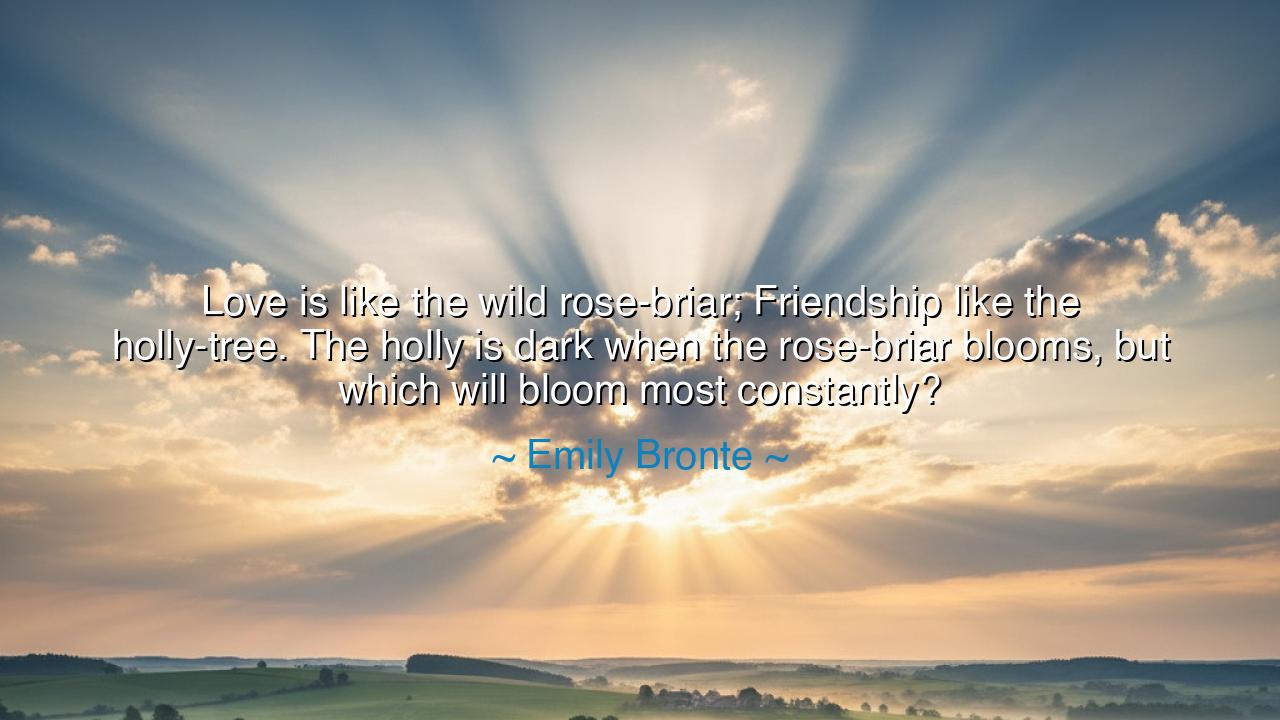
Love is like the wild rose-briar; Friendship like the holly-tree.
Love is like the wild rose-briar; Friendship like the holly-tree. The holly is dark when the rose-briar blooms, but which will bloom most constantly?






“Love is like the wild rose-briar; Friendship like the holly-tree. The holly is dark when the rose-briar blooms, but which will bloom most constantly?” Thus spoke Emily Brontë, a poet whose soul saw beyond the mist and moor of her native land, into the quiet tempests of the human heart. Her words carry the rhythm of nature’s eternal truth — that the splendor of love may burn brightly for a season, yet the steadfastness of friendship endures through the chill of time. This is no mere comparison of affection, but a meditation upon the dual nature of the heart: its yearning for passion’s flame and its need for the enduring light of loyalty.
In the wild beauty of the rose-briar, we see the image of love in its first bloom — radiant, fragrant, and perilous. Its petals intoxicate the senses; its thorns draw blood as swiftly as they inspire devotion. The rose-briar is love in its youth, love that dazzles and consumes. It springs forth in the warmth of emotion, and though it stirs the spirit to heights of joy, it is also bound to fade, for what burns too brightly cannot long remain. Brontë saw this truth not with bitterness, but with the wisdom of one who had felt the fleeting warmth of human affection and known its passing chill.
In contrast stands the holly-tree — evergreen, unadorned, yet steadfast through all seasons. It is friendship, constant where love is wild, enduring where passion wanes. While the rose-briar blooms in the golden sun of spring, the holly stands dark and plain. But when winter comes, when the winds of hardship sweep across the soul, it is the holly that remains green, offering shelter and hope. Friendship does not dazzle, but it sustains; it does not burn, but it warms. The holly’s constancy is the quiet heroism of the heart — the power to endure, to protect, and to remain when all else has withered.
Consider, for a moment, the story of Cicero and Atticus, men of ancient Rome. Cicero, the great orator, knew both glory and exile; he tasted triumph and disgrace alike. Yet through every rise and fall, his friend Atticus remained. When Cicero was banished, Atticus sent letters of comfort; when Cicero’s fortunes turned, Atticus stood neither envious nor aloof. This friendship, tested by time and power, proved itself a holly-tree amid the frost. No rose of fleeting affection could have withstood such seasons. Thus, from their story we learn that true friendship, like the holly, is not measured by the warmth of days, but by its endurance in the cold.
Brontë’s question — “which will bloom most constantly?” — is not a dismissal of love, but an invitation to discernment. Love and friendship both have their seasons and their purpose. Love awakens the heart, gives it color and song; but friendship sustains it, gives it form and strength. To seek one without the other is folly. The wise soul cherishes both — the rose for its beauty, and the holly for its steadfastness. Yet it is friendship, slow and quiet, that carries us through the long winters of life when love’s bloom has faded.
And yet, we must remember — even the holly-tree was once tender and small, nurtured by care and trust. Friendship, too, requires tending: honesty, patience, and forgiveness. It is not born fully grown, but strengthened through time and trial. Those who would have such constancy must first be constant themselves. To be a true friend is to choose loyalty over convenience, compassion over pride, presence over silence. In a world that celebrates fleeting passions, the one who keeps faith in friendship becomes a rare and noble soul.
Therefore, my child, learn this: love may quicken your heart, but friendship will guard it. Celebrate love when it blooms, but do not despise its passing; honor friendship when it stands beside you, even when all else has gone. Let your love be as the rose — fragrant and full of life — but let your friendship be as the holly — enduring, steadfast, and evergreen. For when the frost of time falls upon your years, it will not be the roses you remember, but the faithful holly that stood beside you through every storm.
And so, walk wisely. Love greatly, but befriend deeply. Tend the holly-tree within your heart, that it may stand firm when the petals of the rose have fallen. For beauty fades, but constancy is divine; and the one who cherishes both the bloom and the leaf shall know the fullness of life’s truest garden.






AAdministratorAdministrator
Welcome, honored guests. Please leave a comment, we will respond soon